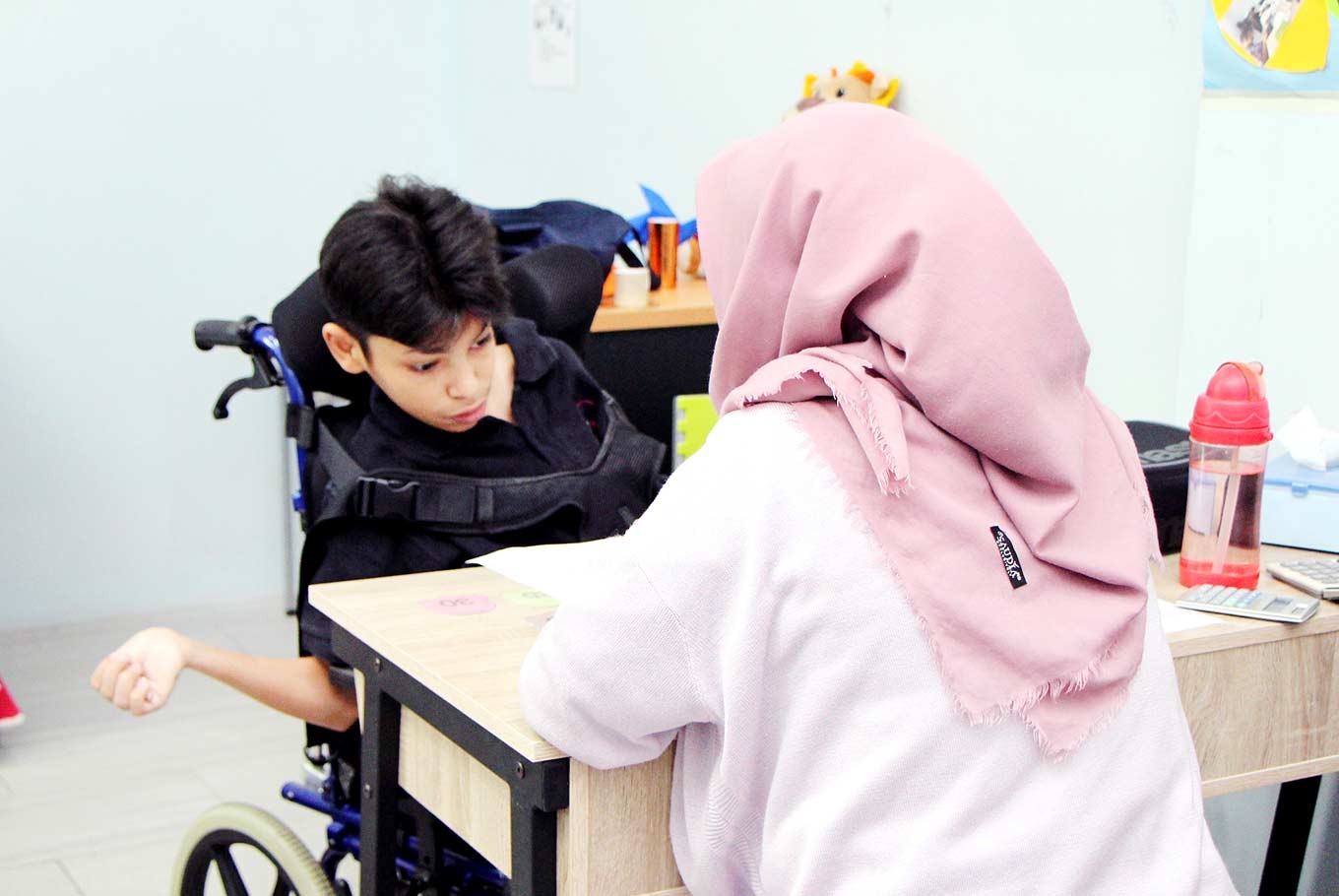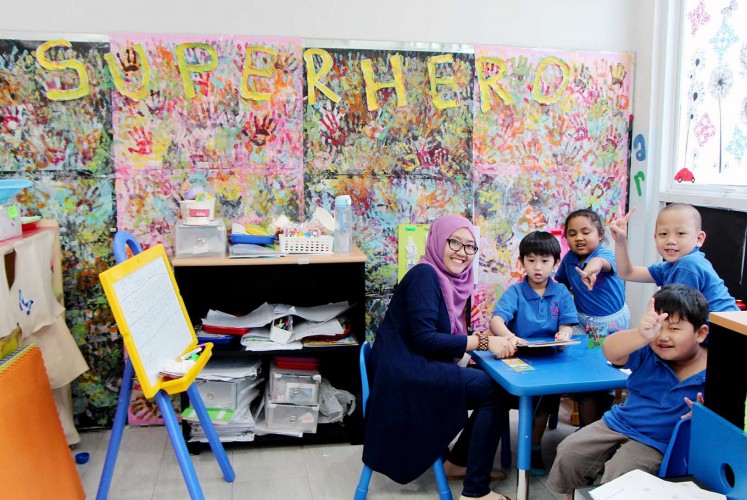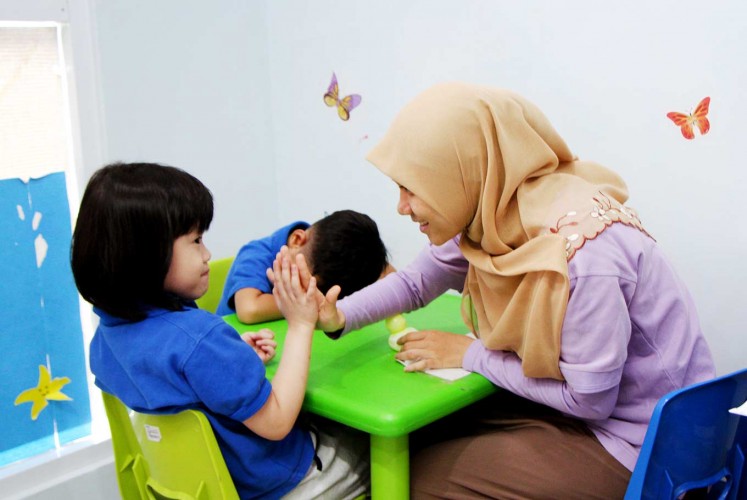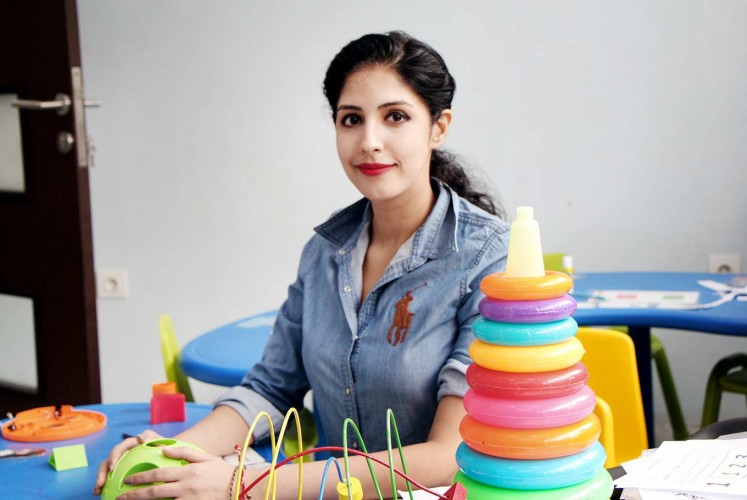Popular Reads
Top Results
Can't find what you're looking for?
View all search resultsPopular Reads
Top Results
Can't find what you're looking for?
View all search resultsSaraswati Learning Center: A special place for the gifted
Children with special needs deserve to get the support they need to contribute to society in life.
Change text size
Gift Premium Articles
to Anyone
R
eshma Wijaya Bhojwani remembers observing her newborn daughter some years ago. She looked at her eyes, mouth and other parts of her body, and noticed that there was something different about her child.
“From a young age, I’ve dealt with a lot of special needs kids because I grew up with two cousins who had disabilities,” she said.
Reshma never looked at her special needs cousins differently. She empathized with them and realized they needed love and care. Growing up, she became even more curious on how to help them.
“After my second child was diagnosed with Down’s syndrome, I decided to focus my life on helping other children with special needs lead a normal life,” she said.
She decided to pursue a degree in special needs education and behavioral therapy. At the same time, she began searching for a space to start classes for special needs children.
Having an empty house available in Cempaka Putih, Central Jakarta, Reshma’s father offered to rent it out to her. The school started with 17 children, but in only 18 months, that number grew to 40.
“There are many schools in Jakarta for special needs children, but our school, Saraswati Learning Center, is unique because firstly, we accept all kinds of [disabilities]. Second, we have our own structure and strategy that allow us to combine kids with different special needs in one class, but also protect them,” Reshma said.
Prior to joining a class, a prospective student will first be diagnosed by the school’s clinical psychologist. If the child has behavioral issues, such as tantrums, then he or she will enter a transition class.
Fun day: Children and their teacher pose during a classroom activity at Saraswati Learning Center in Cempaka Putih, Central Jakarta. (Aruna Harjani/File)“During the transition process, we will train them and teach them the guidelines on how to express themselves and how to communicate. We teach them strategies on how to handle their tantrums, so they will understand the school’s procedures,” Reshma said.
Parents of children with special needs are often left with minimal information on how to raise their children and where to send them for therapy.
Martha, a mother who sends her child to Saraswati, said that at first, she was clueless about her son’s hyperactivity.
“He couldn’t sit in one place and would climb on everything, whether it was our fence or the neighbor’s. Inside the house, he would open and close the refrigerator door, room doors and so on. His tantrum would last around three hours,” she said.
Martha and her husband sought advice from a child psychologist and a doctor, and were told that their son had special needs.
After some research and medical examinations, Martha learned to exclude gluten and sugar from her child’s diet, and recognize his allergies.
“There is no help center for parents of children with special needs in Jakarta, where you can meet several specialists who can guide you on what to do and where to go. I had to do my own research to look for the kind of therapy that suited my child’s needs,” Martha said.
We did it: A student gives her teacher a high five. (Aruna Harjani/File)Prior to joining Saraswati, Martha’s son received therapy at four different clinics because it was hard to secure an appointment at each facility. Experienced therapy centers are also mostly located in big cities like Jakarta and Surabaya in East Java, forcing parents from small cities to travel with their children for therapy.
Parents do not only struggle with getting appointments and finding suitable doctors, they also have to dig deep into their pockets for therapy sessions that cost between Rp 200,000 (US$14) and Rp 350,000.
Martha said that in some developed countries, the government provide support for children with special needs, ranging from funds and guidance on the necessary treatments for the children.
Meanwhile, in Indonesia, finding inclusive schools that accept children with special needs is a challenge.
Nuanza, whose son has hypothyroidism, a condition that affects his motor skills, said she tried enrolling her son into a standard school. However, after a few months, the teacher told her that her son wasn’t able to grasp any of the lessons and always wanted to leave the classroom.
“He couldn’t focus and follow the rules. He couldn’t make friends as many of his classmates bullied him because of his condition,” she said.
For parents, Saraswati and its integrated curriculum has become a new home for their children.
“My child has become more social in Saraswati. Previously, he would play by himself, but recently, he has started making friends. He has also started writing and looking forward to going to school,” Martha said.
Reshma said Saraswati’s teachers focus on the children’s strengths rather than their weaknesses.
“From there, we develop a program that caters to the children’s needs, but also correlates with their academic milestones,” she said.
Reshma Wijaya Bhojwani (Aruna Harjani/File)An autistic child who is very good at math but lags in his or her communication skills, for example, will receive a tailor-made program that focuses on math and refines his/her speaking and writing skills in accordance with the child’s learning style.
The school has also started developing its own workbooks that cater to the children’s needs.
“The children are taught to read and there is nothing that they can’t do. […] Each child has his or her own way of learning. Everyone is unique,” Reshma explained.
She said that many parents are unaware of the importance of early intervention in raising special children.
“When you know your child has any kind of disability, it is best that he or she join an Early Intervention Program,” Reshma said, adding that in her experience, Singaporean hospitals provided all the necessary guidelines and treatments required for babies with special needs.
Reshma recently started her own Early Intervention Program, in which physiotherapist, occupational therapist and speech therapists guide children aged from zero to 3 years of age.
“I would like to give hope to parents and make them realize that if your child is differently abled, this doesn’t mean that he or she will lead a difficult life. It is actually worth the time and money to invest in [special children], because they have the potential to grow just like the other children,” she said.














